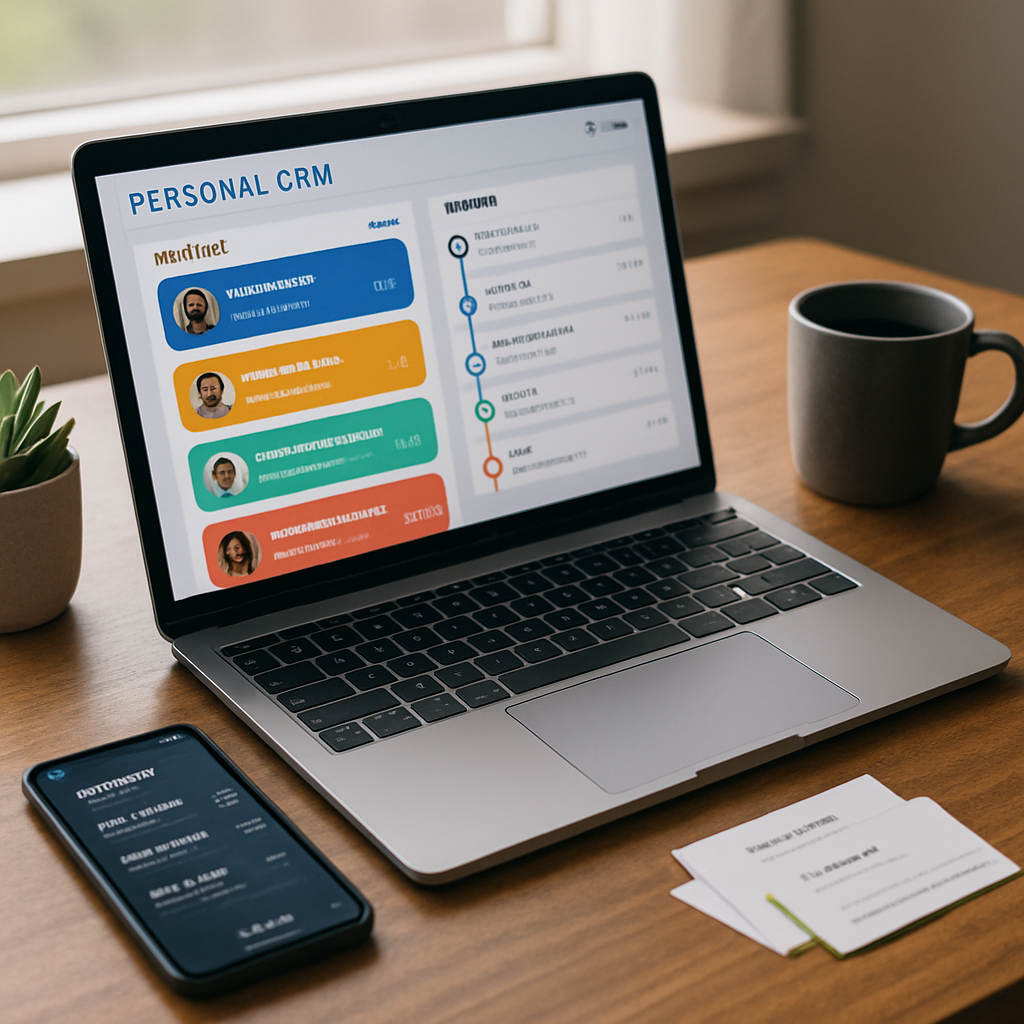Why Your Network Needs a System
Professional relationships scatter across platforms—LinkedIn connections, email threads, business cards, conference contacts, and casual introductions that seemed important at the time. Three months later, someone reaches out, and you're frantically searching old messages trying to remember: Where did we meet? What did we discuss? Did I promise to follow up?
This chaos costs opportunities. Forgotten follow-ups, missed birthdays, cold connections that could have stayed warm—all because managing relationships manually becomes impossible beyond a certain threshold.
Personal CRM software solves this problem. Unlike enterprise sales platforms built around pipelines and revenue metrics, personal CRMs focus on relationship maintenance. They remember context you'd forget, prompt timely outreach, and transform scattered contact information into an organized network you actually use.
Understanding Personal CRM Systems
What Distinguishes Personal from Business CRMs
Traditional business CRMs track sales funnels, forecast revenue, and coordinate team activities. They're built for organizations pursuing deals through structured processes.
Personal CRMs take a fundamentally different approach. They prioritize relationship quality over transaction quantity, individual connections over team collaboration, and staying in touch over closing deals.
Key differences:
- No sales pressure: Personal CRMs don't care about quarterly targets or conversion rates
- Individual focus: Built for one person managing their network, not teams sharing accounts
- Relationship context: Emphasize remembering personal details, conversation history, and connection origins
- Simpler structure: No complex workflows, approval chains, or reporting hierarchies
- Flexible organization: Tag and categorize however makes sense to you, not company-mandated structures
Who Benefits from Personal CRM Systems
Freelancers and independent consultants juggling multiple clients, prospects, and referral sources need systems preventing relationship gaps that cost business.
Job seekers and career builders benefit from tracking recruiter conversations, informational interviews, alumni connections, and professional introductions that might lead somewhere months later.
Entrepreneurs and startup founders rely on networks for funding, partnerships, customer development, and hiring. Personal CRMs prevent valuable connections from going cold during busy periods.
Community organizers and nonprofit leaders manage hundreds of ongoing relationships—donors, volunteers, partners, and beneficiaries—requiring organized tracking beyond what memory allows.
Business development professionals maintain extensive networks where relationship quality directly impacts opportunity flow, making systematic contact management essential.
The connecting thread: these professionals depend on relationships, not just transactions. They need to remember people, not just track deals.
Essential Features Worth Considering
Contact Organization Capabilities
The foundation of any personal CRM is how it structures your network. Look for systems allowing multiple organizational schemes—tags for relationship types, categories for industries, custom fields for information specific to your work.
Effective personal CRMs let you filter contacts by last contact date, relationship strength, or any custom criteria you define. This flexibility means finding "everyone I met at conferences this year" or "warm introductions I haven't followed up with" takes seconds, not searches.
Reminder and Follow-Up Systems
The most valuable feature in personal CRMs might be the simplest: reminding you to reach out. Quality systems let you schedule follow-ups when ending conversations, set recurring reminders for regular check-ins, and even suggest contacts you haven't engaged recently.
The best implementations feel gentle rather than overwhelming. They nudge without nagging, understanding that relationship maintenance should feel natural, not like another task list.
Integration with Existing Tools
Your network already exists across email, calendars, LinkedIn, and phone contacts. Personal CRMs that sync seamlessly with these platforms save enormous time compared to manual entry.
Strong integrations mean emails automatically attach to contact records, calendar meetings log as interactions, and LinkedIn updates refresh profile information. This automation keeps your system current without constant manual updates.
Automatic Enrichment Features
Advanced personal CRMs pull in publicly available information—job changes, company news, social media updates—giving you conversation hooks and context without research.
When someone in your network switches jobs, gets promoted, or their company makes news, enrichment features flag these opportunities for timely, relevant outreach. This transforms your CRM from a static database into an active relationship assistant.
Privacy and Data Control
Your network represents sensitive professional relationships. Personal CRM platforms handling this information should provide clear data ownership, easy export capabilities, and transparent privacy policies.
For maximum control, some professionals prefer self-hosted open-source options. Others accept cloud hosting convenience in exchange for strong security practices and export functionality.
Seven Personal CRMs Worth Exploring
1. Clay: The Intelligence Amplifier
Best suited for: Professionals wanting comprehensive contact enrichment and automation
Strengths:
- Automatic profile enrichment from multiple data sources
- Job change notifications and company news tracking
- Timeline views combining emails, meetings, and notes
- Clean interface across web and mobile platforms
Limitations:
- Higher price point than basic options
- Data richness can overwhelm until curated
- Learning curve steeper than simpler alternatives
Clay transforms basic contact information into rich profiles automatically. Within hours of importing contacts, the system populates LinkedIn data, recent job changes, social media profiles, and even personal interests gleaned from public information.
The timeline feature proves particularly valuable, consolidating every interaction—emails sent and received, calendar meetings, manual notes—into chronological narratives. Before important conversations, you can quickly refresh context without hunting through multiple platforms.
Job change alerts provide natural outreach opportunities. When connections move to new roles, Clay notifies you, enabling timely congratulations messages that keep relationships warm.
The investment makes sense for professionals whose success depends on network quality—investors, business development executives, high-touch consultants. For casual networkers, the features and cost might exceed needs.
Pricing: Limited free tier; paid plans from $10 monthly
2. Dex: The Relationship Maintenance System
Best suited for: Founders, freelancers, and networkers prioritizing warm connections
Strengths:
- Fast setup with minimal configuration
- Clean contact timelines for context recall
- Thoughtful reminder system for follow-ups
- Strong Gmail, calendar, and LinkedIn integration
Limitations:
- Manual updates required for enrichment
- Mobile experience less refined than desktop
- Limited automation compared to Clay
Dex prioritizes usability over feature density. The interface feels like a thoughtfully designed address book rather than enterprise software, making adoption nearly frictionless.
Organization through tags and custom fields happens intuitively. Creating categories like "potential clients," "warm referrals," or "conference connections" takes seconds, and filtering by these categories is equally fast.
The reminder system strikes the right balance—persistent enough to prevent relationship drift, gentle enough not to feel overwhelming. Set reminders when ending conversations, and Dex will nudge you at the appropriate time.
Integration quality is high. Gmail and calendar connections work smoothly, automatically logging interactions. LinkedIn syncing requires more manual effort but maintains reasonable profile currency once established.
Where Dex falls short is automation. It won't automatically notify you of job changes or pull in fresh data without prompting. For professionals valuing simplicity over comprehensiveness, this tradeoff often makes sense.
Pricing: Plans begin at $12 monthly with annual commitment
3. Covve: The Mobile-First Solution
Best suited for: Professionals managing networks primarily from smartphones
Strengths:
- Smart reconnection reminders based on relationship patterns
- Automatic job change and company news notifications
- Native mobile design optimized for phones
- Clean, uncluttered interface
Limitations:
- No desktop application
- Some enrichment features require paid plans
- Integration options more limited than competitors
Covve recognizes that many professionals live on their phones. The application is built mobile-first rather than desktop-shrunk, making every interaction feel natural on smaller screens.
The reminder intelligence impressed during testing. Rather than rigid schedules, Covve learns from your interaction patterns and suggests reconnections at appropriate intervals. Relationships requiring monthly check-ins get treated differently than annual catch-ups.
Automatic enrichment provides valuable context. When contacts change jobs or their companies make news, Covve surfaces these updates, creating natural conversation starters beyond "just checking in."
Setup speed is notable—contacts import quickly from phone, Gmail, and LinkedIn, with duplicates automatically merged. Within an hour, most users have a functioning system.
The mobile-only approach limits use cases. If you work primarily from desktops or need sophisticated views for network analysis, desktop-capable alternatives make more sense.
Pricing: Free plan available; paid tier starts at $9.99 monthly
4. Streak: The Gmail-Native Option
Best suited for: Gmail users wanting CRM functionality without leaving their inbox
Strengths:
- Lives entirely inside Gmail interface
- Pipeline views and organizational tools
- Email-based reminders and follow-ups
- Collaboration features for shared inboxes
Limitations:
- Gmail dependency limits non-email interactions
- Minimal contact enrichment
- Less effective for non-Gmail users
Streak eliminates app-switching by embedding CRM functionality directly into Gmail. Every email thread becomes part of a contact timeline, and pipeline views organize relationships without leaving your inbox.
Getting started requires minimal effort. The Chrome extension adds CRM features to Gmail within minutes. Creating pipelines, adding tags, and setting reminders happens in familiar Gmail contexts.
Organization works through email-based logic. Conversations become records, labels become categories, and scheduled sends become reminders. For Gmail power users, this integration feels natural.
The limitation is scope. Streak works brilliantly for email-based relationships but struggles with connections maintained through other channels. LinkedIn networking, phone calls, and in-person meetings require manual logging.
Enrichment capabilities are minimal—Streak won't automatically notify you of job changes or pull in social media context. It excels at managing what happens in Gmail, not augmenting with external intelligence.
Pricing: Free plan for basic features; paid tiers from $49 per user monthly
5. Airtable: The Customizable Framework
Best suited for: People comfortable building their own systems who want complete control
Strengths:
- Familiar spreadsheet-style interface
- Extensive customization through fields and views
- Generous free plan for small networks
- Multiple view types (grid, kanban, calendar, gallery)
Limitations:
- No built-in reminder system without extensions
- Manual enrichment required
- Steeper learning curve than purpose-built CRMs
Airtable provides a blank canvas rather than a pre-configured system. You design exactly the fields, views, and organization that match your thinking.
The spreadsheet interface lowers barriers for people intimidated by specialized software. Adding contacts, updating fields, and creating filters feels like working in Excel, but with more flexibility.
View diversity enables seeing your network from multiple angles. Grid view for data entry, kanban for pipeline-style tracking, calendar view for scheduled follow-ups, and gallery view for visual browsing—all from the same underlying data.
The gap is automation. Airtable doesn't send reminders natively or automatically enrich contacts. These capabilities require connecting external tools through Zapier, Make, or custom scripts. For technically comfortable users, this flexibility enables powerful customization. Others might find the DIY requirement frustrating.
Pricing: Free plan available; paid tiers from $20 per user monthly
6. Monica: The Privacy-Focused Alternative
Best suited for: Privacy-conscious individuals wanting data ownership and control
Strengths:
- Completely free and open-source
- Self-hosting option for maximum privacy
- Straightforward interface and reminders
- No third-party data sharing
Limitations:
- Technical setup required for self-hosting
- No integrations with Gmail, Outlook, or LinkedIn
- Manual enrichment only
- Basic feature set compared to commercial options
Monica strips personal CRM to essentials: contacts, notes, reminders, and relationship tracking. No enrichment algorithms, no automatic syncing, no AI suggestions—just a clean system you completely control.
The open-source nature means your data never touches corporate servers unless you choose cloud hosting. For professionals handling sensitive relationships or simply valuing privacy, this control provides peace of mind.
Setup simplicity stands out. Within an hour, you can have contacts entered, birthdays logged, and follow-up reminders scheduled. The learning curve is minimal because the features are straightforward.
The privacy comes with tradeoffs. Monica won't automatically sync with Gmail, pull LinkedIn updates, or notify you of job changes. Every piece of information requires manual entry. For professionals managing networks of hundreds, this manual approach becomes impractical.
Pricing: Free when self-hosted; cloud hosting $9 monthly or $90 annually
7. Contacts+: The Synchronization Specialist
Best suited for: People needing unified contact management across multiple accounts
Strengths:
- Seamless synchronization across Gmail, Outlook, iOS, Android
- Automatic duplicate detection and merging
- Business card scanning via mobile app
- Contact enrichment with updated information
Limitations:
- Free plan has restrictive storage limits
- Shallow relationship tracking compared to dedicated CRMs
- Limited timeline and reminder functionality
Contacts+ solves a specific problem exceptionally well: scattered contact information across multiple platforms. If your network lives partly in Gmail, partly in Outlook, partly on your phone, and partly in old business cards, Contacts+ unifies everything.
The synchronization impressed during testing. Within minutes of connecting accounts, duplicates were identified and merged, outdated information was updated, and a single accurate contact list emerged from chaos.
Enrichment focuses on accuracy over relationship intelligence. Contacts+ updates job titles and profile photos automatically but doesn't provide deep timeline views or sophisticated follow-up reminders.
The mobile scanning feature adds value for professionals collecting business cards at events. Photograph cards, and the app extracts contact information with surprising accuracy.
Where Contacts+ falls short is relationship management depth. It excels at maintaining an accurate, unified address book but provides minimal tools for tracking conversations, scheduling follow-ups, or maintaining relationship context.
Pricing: Free plan with limitations; paid plans from $9.99 monthly
Quick Selection Guide
| System | Best For | Starting Price | Key Differentiator |
|---|---|---|---|
| Clay | Network intelligence | $10/month | Automatic enrichment |
| Dex | Warm relationships | $12/month | Simple, effective reminders |
| Covve | Mobile professionals | $9.99/month | Smartphone-native design |
| Streak | Gmail users | $49/month | In-inbox functionality |
| Airtable | Customizers | $20/month | Complete flexibility |
| Monica | Privacy seekers | Free/$90/year | Self-hosted option |
| Contacts+ | Multi-platform users | $9.99/month | Synchronization excellence |
Building Your Own Personal CRM
When DIY Makes Sense
Pre-built personal CRMs offer convenience but carry subscription costs and potential lock-in. Building your own system provides complete control, zero recurring fees, and perfect customization to your workflow.
Consider DIY approaches when:
- Your network is small enough (under 100 contacts) that manual management remains feasible
- You enjoy designing systems and don't mind maintenance
- Budget constraints make subscriptions impractical
- Existing CRMs don't match your specific organizational logic
Platform Options
Google Sheets: The simplest option. Free forever, accessible anywhere, familiar interface. Works well for straightforward contact lists with manual reminder systems. Lacks automation and enrichment entirely.
Notion: Combines database functionality with note-taking and task management. Free for individuals, though database limits kick in with growth. Excellent for combining contact management with meeting notes and project tracking.
Airtable: More sophisticated than spreadsheets, simpler than full databases. Free tier supports 1,000 records. Multiple view types help visualize networks differently. Automation possible but requires paid plans.
Essential Structure
Regardless of platform, effective DIY personal CRMs include these core elements:
Basic contact information: Name, email, phone, company, role
Context fields:
- How you met (conference, introduction, cold outreach)
- Relationship type (client, prospect, mentor, peer)
- Connection strength (close, warm, cold)
Interaction tracking:
- Last contact date
- Next follow-up date
- Conversation notes and key details
Custom fields: Add whatever matters to your work—industry, location, shared interests, projects discussed, referral potential
Adding Automation
DIY systems gain power through automation tools:
Zapier or Make: Connect your database to email, calendar, and task management. Examples:
- New Gmail contacts automatically add to your database
- Approaching follow-up dates create calendar reminders
- Stale contacts (no interaction in 90+ days) trigger review tasks
Native automation: Airtable and Notion include built-in automation. Set up rules that:
- Send you weekly digests of upcoming follow-ups
- Flag contacts by last interaction date
- Calculate relationship strength scores based on interaction frequency
Calendar integration: Link your CRM to Google Calendar or task managers. Schedule follow-ups as events, ensuring reminders appear where you already check daily.
The DIY Tradeoff
Building your own system provides maximum flexibility and zero subscription costs. The price is time and effort—you'll spend hours on setup and ongoing maintenance that commercial tools handle automatically.
DIY systems won't automatically enrich contacts, won't notify you of job changes, and won't provide sophisticated mobile interfaces. They excel at customization and cost control while sacrificing convenience and intelligence.
For professionals with technical comfort and specific requirements not met by existing tools, DIY approaches work well. Most others benefit more from purpose-built solutions despite subscription costs.
Making Your Selection
Start with Workflow Assessment
Don't choose based on feature lists. Instead, map your actual relationship management needs:
How large is your network? Under 50 contacts might not justify sophisticated tools. Over 200 makes systematic management essential.
Where do interactions happen? Primarily email? Gmail-native tools make sense. Across multiple channels? Comprehensive platforms work better.
What causes relationship drift? Forgotten follow-ups? Prioritize reminder systems. Lost context? Value timeline and note features. Missed opportunities? Consider enrichment capabilities.
How much time can you invest? High-maintenance DIY systems or feature-rich platforms requiring configuration demand more upfront effort than simple, opinionated tools.
Test Before Committing
Most personal CRMs offer free trials or limited free plans. Take advantage by:
- Importing real contacts: Don't test with dummy data. Use 20-30 actual relationships to see how the system feels.
- Setting genuine reminders: Schedule real follow-ups and evaluate whether reminders arrive at appropriate times in useful formats.
- Testing integration: Connect your actual Gmail, calendar, and LinkedIn to verify synchronization quality and reliability.
- Using for one week: Daily use reveals friction points invisible in demos. Does adding notes feel natural? Do reminders help or annoy? Is finding specific contacts fast or frustrating?
- Evaluating mobile experience: If you work from phones frequently, spend significant trial time on mobile apps, not just desktop.
Consider Growth Trajectory
Your network will expand. Choose systems that scale gracefully:
- Check if free plans have contact limits that might bind soon
- Verify pricing for next tier to avoid surprise costs
- Ensure export functionality exists if you outgrow the platform
Value Privacy Appropriately
Personal CRMs store sensitive professional relationships. Evaluate:
- Where is data stored (company servers vs. self-hosted)?
- What are data export options if you leave?
- How transparent is the privacy policy?
- Have there been security incidents or data breaches?
For most professionals, established companies with clear policies provide adequate protection. Those handling extremely sensitive relationships might prioritize open-source self-hosted options despite convenience sacrifices.
Common Questions About Personal CRMs
Is personal CRM software necessary for small networks?
Phone contacts and mental tracking suffice for networks under 20-30 people with infrequent interaction needs. Beyond that threshold, systematic management prevents relationship drift and missed opportunities that memory alone can't prevent.
How do personal CRMs differ from business CRM platforms?
Business CRMs focus on sales pipelines, team collaboration, and revenue tracking. Personal CRMs prioritize individual relationship maintenance through reminders, notes, and context—no deal stages, forecasting, or team features.
Which personal CRM works best for beginners?
Dex and Covve offer the gentlest learning curves with intuitive interfaces that feel like enhanced address books. Both get you functional quickly without overwhelming features.
Are free personal CRM options viable long-term?
Monica (open-source), basic Airtable, and limited Notion work indefinitely free but with constraints—manual enrichment, storage limits, or reduced features. For serious networkers, paid tools typically justify costs through time savings and relationship value.
Will personal CRM systems increase workload rather than reduce it?
Poor implementations certainly can. Quality personal CRMs with good integrations actually save time by automatically capturing interactions, surfacing relevant context before conversations, and preventing the mental overhead of manually tracking relationships.
Can I build adequate systems using spreadsheets?
Absolutely, particularly for networks under 100 contacts. Add columns for last contact date, next follow-up, and notes. Pair with calendar reminders. You'll miss automation and enrichment but gain complete control at zero cost.
How secure is my network data in personal CRM systems?
Security varies by platform. Cloud services store data on their servers with varying security practices. Open-source self-hosted options give complete control. Always choose platforms offering easy data export regardless of security approach.
What happens if I want to switch personal CRM platforms?
Quality platforms provide CSV or vCard export of contact data. Notes, tags, and custom fields may not transfer completely, requiring some rebuilding in new systems. This migration friction argues for careful initial selection.
Final Perspective
Personal CRM software represents an investment in relationship capital—the professional network that creates opportunities, provides support, and defines career trajectories. Without systems, valuable connections fade through forgotten follow-ups and lost context.
The right choice depends entirely on your situation. Extensive networks benefit from sophisticated enrichment and automation. Smaller networks might need only simple reminders and note-taking. Technical professionals might build custom solutions. Privacy-conscious individuals might prioritize data ownership.
Start somewhere. Import a dozen contacts, set a single reminder, and experience how systematic relationship management feels. Adjust from there rather than searching endlessly for perfect solutions that don't exist.
Your network represents years of relationship building. Invest in systems that help maintain and strengthen those connections rather than letting them gradually weaken through neglect.
The personal CRM that actually gets used beats the feature-rich one that feels like work. Choose accordingly.





